On September 24, 1938, three brave women made a non-stop flight from Moscow to the Far East of Russia.
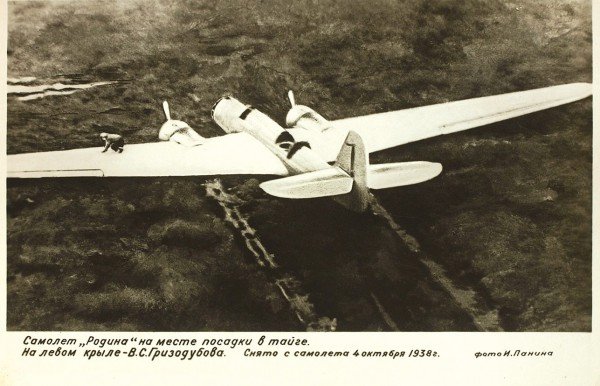
(plane Rodina("Homeland") at the landing site in the taiga, on the left wing sits Valentina Grizodubova)
The fact that a 19-year-old Kharkiv student Valentina Grizodubova will go to an aero club, then to a flight school and become a pilot of civil aviation, could be expected. The daughter of one of the first Russian pilots and aircraft designers Stepan Grizodubov lived in the atmosphere of flights from birth.At the head of the collective farm from Berdyansk Polina Govyaz (on the second marriage of Osipenko) the desire to fly arose, apparently due to a marriage with military pilot Stepan Govyaz. She learned to fly a plane the simplest U-2 when she was a 23-year-old waitress in the flight canteen - and only then, in 1932, she was admitted to the military school for pilots.But the 20-year-old laboratory assistant at the Air Force Academy Marina Raskov initially was fascinated by desk air navigation. But so much that in 1933 a student of correspondence education passed the exam for the navigator of the aircraft, and in 1935 learned to fly.And all three dreamed of records, which in those years the country lived. Sooner or later they had to meet...
In May 1937, Osipenko put on the flying boat MP-1 three world records of the altitude of the flight in the class of seaplanes.
In October 1937, Grizodubov at the training UT-2 and training UT-1 sets four world records of speed and altitude in the class of light land planes. And on October 24, completing the flight Moscow-Aktyubinsk together with the co-driver Raskova on the light I-12 (AIR-12), he also beats a record of the range of the flight in a straight line.
Finally, on May 24, 1938, the crew of the MP-1 as part of the first pilot Polina Osipenko, the second pilot Vera Lomako and the navigator Marina Raskova beats the women's world record in a closed route, and on July 2, in the Sevastopol-Arkhangelsk flight, in a straight line and in a broken line line.
What does Grizdubov answer? She asked to allow her flight Moscow - Khabarovsk, to beat the absolute female world record range. And invites the second pilot Captain Polina Osipenko, and the navigator - Senior Lieutenant Marina Raskova.
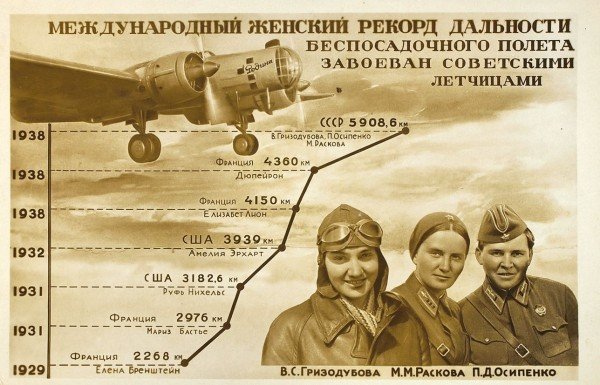
(Table comparison of the record in the range of female flights -Lion, Earhart,Osipenko and more)
For the flight, one of the three prototypes and one not launched into the series of the long-range bomber DB-2, designed in 1935 under the direction of Pavel Sukhoi, was singled out. The weapon was removed from the aircraft, installed special assembly engines, additional gasoline tanks, new instrumentation and radio equipment.Improved the view from the cockpit of the navigator. September 24, 1938 at 8 :16 am "Homeland" started from the Moscow region Shchelkovsky airport to the east.The end of September is the time of the year when the weather on the Moscow-Khabarovsk route deteriorates sharply.After 50 kilometers, the earth was covered with clouds.
And almost all the remaining 6400 had to fly beyond the visibility of the earth, according to instruments - taking bearings on radio beacons and thus determining their location. And if in the beginning they went over the clouds, then they had to enter Krasnoyarsk before them - they collided with clouds, the upper limit of which exceeded 7000 meters.
A blind flight began.
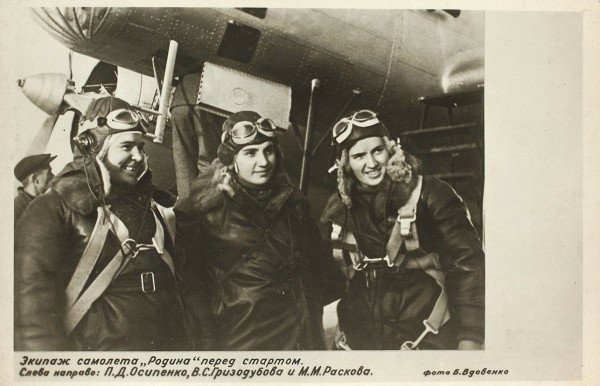
( The crew of the plane "Homeland" before the start: P.Osipenko,V.Grizodubova,M.Raskova)
Overboard is -7°C, and the airplane enveloped in moisture became icy. The windshields of the first pilot's and navigator's cabins were covered with ice, faded and lateral.
It was necessary to gain altitude to break through the clouds.
It disappeared only at 7450 meters - and to the Sea of Okhotsk airplane "Homeland" was no less than seven thousand. The crew worked in oxygen masks.
Naturally, fuel consumption has increased. The flow rate has increased the long climb when the motors run in a very tight mode.
However, on seven thousand the road speed has increased - the passing wind has helped.
But then the radio equipment refused.
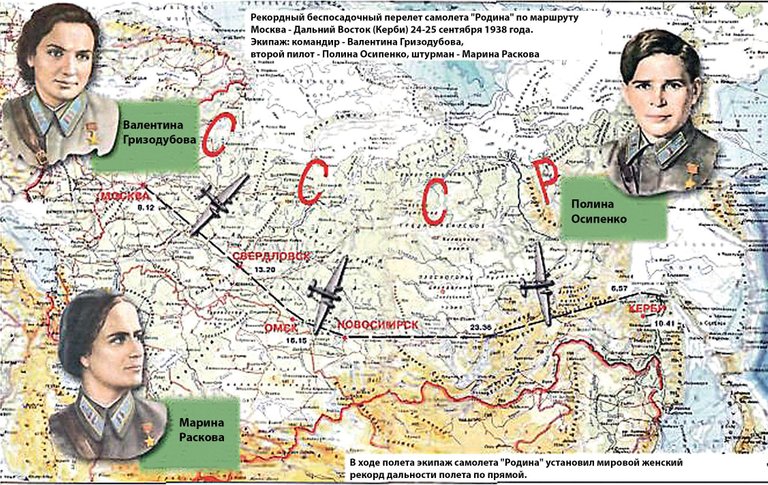
(Flight map of the plane "Homeland")
It was not by chance that south of Tynda Grizodubova changed the route - she did not turn to the right, heading for Khabarovsk, 120° course, but continued to follow course 90°- strictly to the east, to Nikolayevsk-on-Amur.
Hence, the signals of radio beacons are not audible, you can not fly by radio compass. And to try to withstand without seeing the ground, course 120° on an ordinary, magnetic compass is dangerous. This course will lead too close to the border with the Japanese-occupied Manchuria. A little crossed it - and the border military incident is possible!
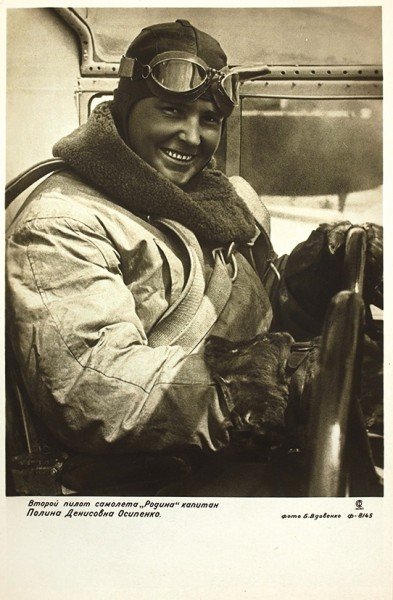
(Second pilot P.Osipenko in "Homeland" plane)
Following the course of 90, on the morning of September 25, 1938, "Motherland" came to the Tugursky Bay of the Sea of Okhotsk - clearly marked below through gaps in the clouds.
So, the world's women's distance record has already been beaten! And you just have to decide where to sit down (Khabarovsk was far behind).
The hunting season begins. Evenki(the indigenous people of the coast of the Sea of Okhotsk) go to the taiga for almost the whole winter. Their wives, like hundreds of years ago, conduct a ritual of rituals, so that their husbands return with rich prey.But unexpectedly in the sky begins to spin an unknown buzzing steel bird.
The Chukchagir lowland is several dozen square kilometers of impenetrable marshes. Now they are frozen and move around safely, although it is quite difficult. 81 years ago, the plane "Homeland"made an emergency landing near the Yukochi hills. There is no way to get there without a special equiped cross-country vehicle.
On an uneven surface, one had to sit on the belly, without releasing the chassis. This threatened to crush the forward part of the fuselage. And there - the co-driver's cabin.
Therefore, on the orders of Grizodubova Raskova jumped out with a parachute. Landed navigator Raskova unsuccessful - damaged leg. In addition, the pilot did not have time to take a stock of food - jumped with one tile of chocolate in her pocket. For ten days, limping, dying of hunger, struggling through the impenetrable taiga, Marina Raskova looked for her "Homeland"..
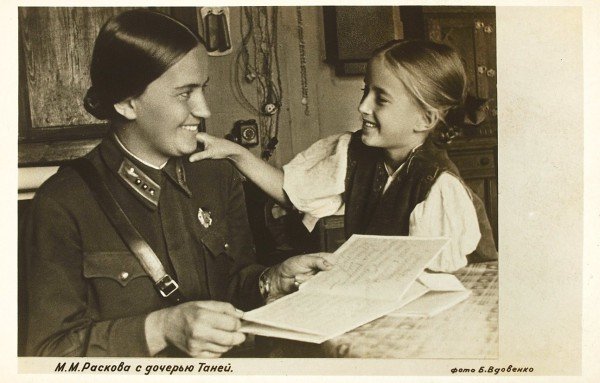
(M.Raskova with her daughter Tatyana)
A "Homeland", knocking out clouds of spray, at 10.45 (in Moscow time) landed on a boggy meadow 72 km south of the village of Kerby.
For 26 hours and 29 minutes it flew 6450 km (on a straight line - 5947).
How did they search for the "Homeland", how did the sports commissars jump to it with a parachute, how the crew led through the taiga to Amgun river valley, how the commander of the Air Force of the 2nd Red Banner Army, Commander Yakov Sorokin and the navigator of "Moscow" plane, the brigade commander Alexander Berdyansky, crashed, flying off to the landing site is a separate topic ...
"Homeland", when the marsh was frozen, was put on the chassis and sent to Moscow.And the rescued female crew of the plane, delivered on the river to Khabarovsk, went to Moscow.
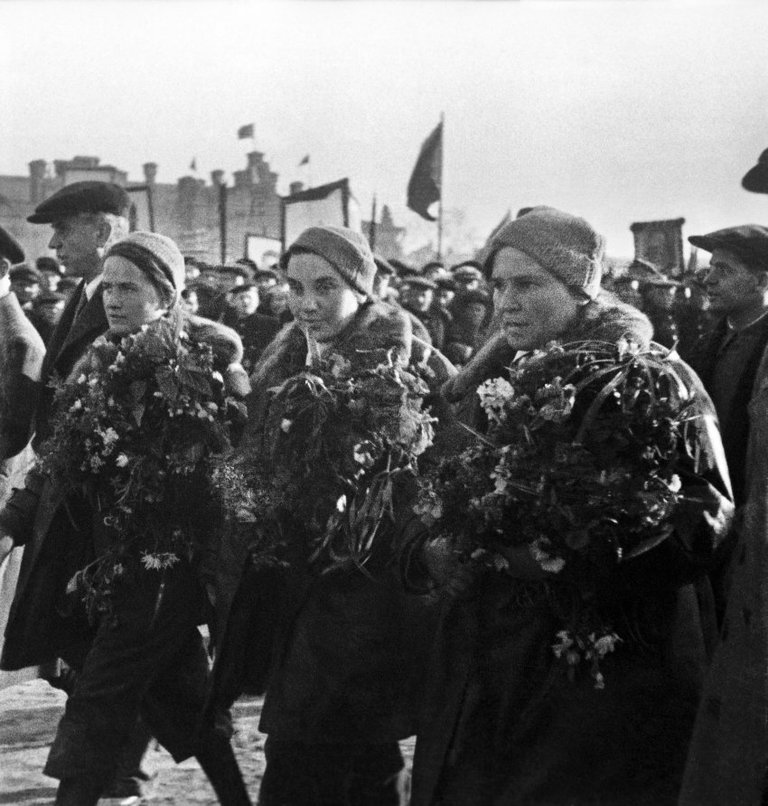
(The crew of the plane at a meeting in Khabarovsk.)
Photos from author's archive and RG-TASS
Thank you for upvote and reading
CHAT is a new community for people that are interested in Culture, History, Art, and Travel.

Your feed is interesting! Thanks for sharing interesting things from this part of the world. Following you!
Thank you, follow you too
@fareast-history мощно!
You got upvoted from @adriatik bot! Thank you to you for using our service. We really hope this will hope to promote your quality content!
Great post. An amazing achievement for women of that time. looking forward to more posts.